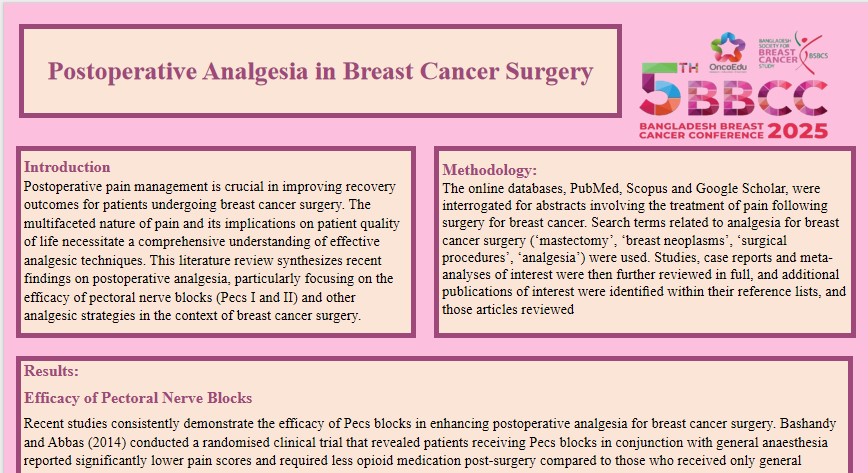Postoperative Analgesia in Breast Cancer Surgery
Authors: Dr Anabil Digarna
Institution: United Hospital Limited
Introduction
Postoperative pain management is crucial in improving recovery outcomes for patients undergoing breast cancer surgery. The multifaceted nature of pain and its implications on patient quality of life necessitate a comprehensive understanding of effective analgesic techniques. This literature review synthesizes recent findings on postoperative analgesia, particularly focusing on the efficacy of pectoral nerve blocks (Pecs I and II) and other analgesic strategies in the context of breast cancer surgery.
Methods
The online databases, PubMed, Scopus and Google Scholar, were interrogated for abstracts involving the treatment of pain following surgery for breast cancer. Search terms related to analgesia for breast cancer surgery (‘mastectomy’, ‘breast neoplasms’, ‘surgical procedures’, ‘analgesia’) were used. Studies, case reports and meta-analyses of interest were then further reviewed in full, and additional publications of interest were identified within their reference lists, and those articles reviewed
Results
Efficacy of Pectoral Nerve Blocks Recent studies consistently demonstrate the efficacy of Pecs blocks in enhancing postoperative analgesia for breast cancer surgery. Bashandy and Abbas (2014) conducted a randomized clinical trial that revealed patients receiving Pecs blocks in conjunction with general anesthesia reported significantly lower pain scores and required less opioid medication post-surgery compared to those who received only general anesthesia. This reduction in pain and opioid consumption suggests that Pecs blocks can effectively manage postoperative pain, leading to improved recovery times and decreased side effects such as nausea and sedation. The integration of Pecs blocks into standard analgesic protocols is advocated to enhance patient outcomes and satisfaction. The evidence from their work suggests a pressing need to explore various nerve block techniques to optimize pain management strategies in this surgical context. Psychological Factors and Pain Perception The psychological aspects of pain management are also critical. Shin et al. (2010) explored how psychological factors influence pain perception and management after surgery, suggesting that addressing these aspects is essential for effective postoperative analgesia. This complements the need for comprehensive pain management strategies that integrate both pharmacological and psychological interventions. By effectively managing acute pain with techniques like Pecs blocks, healthcare providers may reduce the risk of persistent pain and improve overall patient satisfaction. Quality of Recovery and Analgesia Techniques The combination of Pecs and other nerve blocks, such as the transverse thoracic muscle plane block, has been shown to improve postoperative analgesia further. Ueshima and Otake's (2017) study illustrates that this combination leads to lower pain scores and a reduced need for additional analgesics compared to Pecs blocks alone. Gaps in the Literature and Future Research Directions Despite the promising results surrounding Pecs blocks and other analgesic techniques, several gaps remain in the literature. For instance, while the benefits of Pecs blocks are well-documented, there is limited research on the long-term outcomes of different analgesia techniques in breast cancer patients. Future studies could focus on longitudinal assessments of pain management strategies and their impact on chronic pain development. The exploration of combined analgesic techniques also warrants further investigation. While current studies suggest benefits from combining Pecs blocks with other nerve blocks, more rigorous trials are needed to establish standardized protocols that maximize pain relief while minimizing side effects.
Conclusion
In summary, postoperative analgesia in breast cancer surgery has significantly advanced with the introduction of techniques such as Pecs blocks. These methods not only enhance pain management but also contribute to improved recovery experiences for patients. However, persistent gaps in understanding the multifactorial nature of pain and the role of psychological factors call for continued research. By addressing these areas, healthcare providers can further refine pain management strategies, ultimately leading to enhanced patient outcomes in breast cancer surgery.
